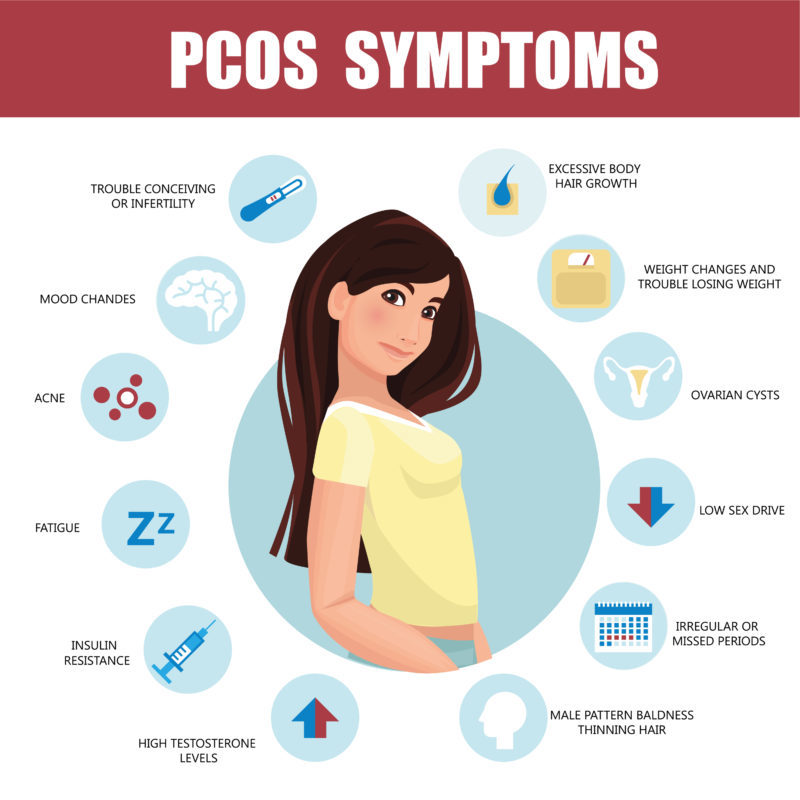What is PCOS(Polycystic Ovary Syndrome)?
In women of reproductive age, polycystic ovary syndrome (PCOS) is a hormonal disorder. There may be infrequent or prolonged menstruation in women with PCOS, or an excess of male hormones (androgen). Numerous small collections of fluid (follicles) may develop in the ovaries and the eggs may not be regularly released.

With PCOS, women produce more male hormones than normal. Because of this hormone imbalance, they skip menstrual periods and are less likely to get pregnant.
PCOS is a “syndrome,” or group of symptoms that affects the ovaries and ovulation. Its three main features are:
- cysts in the ovaries
- high levels of male hormones
- irregular or skipped periods
Affect of Hormone on PCOS.
Your reproductive hormones are out of balance if you have PCOS. You may not have your period on time or not get it if this occurs.
You make hormones to make different things happen in your body. Menstrual cycles are affected by some, as well as your ability to have a baby. Some hormones that play a role in PCOS are:
- Androgens: Men often call them male hormones, but women also have them. They tend to be more abundant in women with PCOS.
- Insulin: This hormone regulates your blood sugar levels. With PCOS, your body may not react correctly to insulin.
- Progesterone: You may not have enough of this hormone, as a result of PCOS. A period might not come for a long time or you might not be able to predict when it will come.
Are there any symptoms of PCOS?

Missed, irregular, infrequent, or prolonged periods are the most common symptoms of PCOS. In addition to causing hair loss, excess androgens can cause acne and hair growth in places you don’t want it. There are several other side effects such as:
- Mood changes
- Pelvic pain
- Darkened skin or excess skin (skin tags) on the neck or in the armpits
- Weight gain around your middle
What Are the Causes of PCOS?

As per studies and report, a health professional do not know all the reason of PCOS occurence in a female body. The disorder is generally genetical i.e. passed on from mother or sister. It might also be caused by problems with insulin production which will affect the ability of the ovaries to ovulate. The exact cause of PCOSof however unknown to anyone. All the possible factors are stated above.
Can PCOS be linked with any complications?
When you have PCOS and your androgen levels are too high, you have a higher risk of complications. Among these complications are:
- Pregnancy problem: In some cases, ovarian cysts can interfere with ovulation. An egg is released each month from one of your ovaries. You can’t become pregnant if a healthy egg is not available to be fertilized by a sperm. Having PCOS may not prevent you from getting pregnant. To make it happen, you may have to take medicine and work with a fertility specialist.
- Metabolic Syndrome: The presence of these symptoms increases the risk of cardiovascular disease. Symptoms include high triglycerides, low HDL (“good”) cholesterol, high blood pressure, and high blood sugar.
- Insulin disorder and diabetes: A high level of insulin resistance may cause your body to make too many androgens. A person who has insulin resistance has trouble absorbing blood sugar from their muscles, organs, and other tissues. Thus, your bloodstream can become too sugary. Your heart and nervous system can be affected by this disease, which is called diabetes.

There could be other Complications associated with PCOS that include:
- High risk of Uterine cancer
- Inflammation of liver
- Depression
- Sleep disorder
- Anxiety, etc.
REFERENCES:
- https://www.webmd.com/women/what-is-pcos
- https://www.healthline.com/health/polycystic-ovary-disease
- https://my.clevelandclinic.org/health/diseases/8316-polycystic-ovary-syndrome-pcos#:~:text
- https://www.mayoclinic.org/diseases-conditions/pcos/symptoms-causes/syc-20353439
- https://www.smsna.org/patients/blog/what-is-pcos
- https://en.wikipedia.org/wiki/Polycystic_ovary_syndrome
- https://joe.bioscientifica.com/view/journals/joe/232/2/R99.xml
- https://www.emedihealth.com/womens-health/reproductive-health/understanding-pcos
- https://junofertility.com/new-international-guidelines-diagnosis-treatment-polycystic-ovary-syndrome-pcos-released/
For more details, kindly visit below.